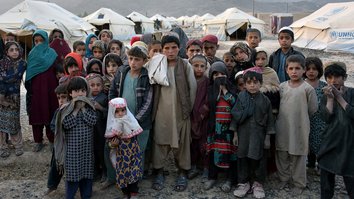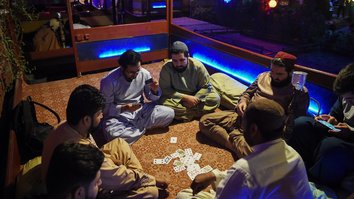KANDAHAR -- Mohammad Sadeq returned to his home on the outskirts of Kandahar city this week to discover it had new occupants -- the Taliban.
"They didn't even allow me to enter," he told AFP Tuesday (July 27) at a camp for displaced people inside Afghanistan's second-biggest city.
Sadeq is one of tens of thousands of Afghans recently uprooted by fighting between the Taliban and government forces that has intensified as the last foreign troops complete their withdrawal.
This week, thousands have made their way by car, bus, truck and on foot to Kandahar -- preferring an uncertain future in a basic city camp to braving the fighting.
![Internally displaced Afghan families are pictured upon their arrival from the outskirts of Kandahar at a refugee camp in Kandahar on July 27. [Javed Tanveer/AFP]](/cnmi_st/images/2021/07/29/30960-000_9gn4bt-585_329.jpg)
Internally displaced Afghan families are pictured upon their arrival from the outskirts of Kandahar at a refugee camp in Kandahar on July 27. [Javed Tanveer/AFP]
![A doctor at a government hospital in Kandahar on July 12 attends an injured man wounded during clashes between Taliban and government forces. [Javed Tanveer/AFP]](/cnmi_st/images/2021/07/29/30963-000_9eu3cg-585_329.jpg)
A doctor at a government hospital in Kandahar on July 12 attends an injured man wounded during clashes between Taliban and government forces. [Javed Tanveer/AFP]
More than 150,000 have arrived just this month, said local officials.
"I lost two sons in an explosion just in front of my house," said Bibi Aisha, another internal refugee now living on the grounds of a government centre for Hajj pilgrims near Kandahar airport.
"The streets in my neighbourhood were full of human flesh," she added.
Humanitarian organisations warn of a major crisis in coming months as the Taliban continue an offensive in the north.
Kandahar is the birthplace of the Taliban, from where the hardline Islamic group rose to power in 1996 -- before controlling most of the country by 2001, when the US-led forces ousted the group.
Brutal clashes
Where the Taliban take over without a fight -- particularly in deeply conservative rural areas -- life continues much as before.
However, civilians are being forced to flee their houses in developed areas because of clashes between Afghan forces and the Taliban.
At the camp near Kandahar airport on Tuesday, scores of children were playing in the dust as women boiled water for tea on makeshift stoves.
A young boy washed clothes in a plastic tub as a group of wizened old men sipped green tea from tiny glasses, waving away a constant assault of flies.
Hundreds of thousands of Afghans have been displaced internally this year alone, according to the United Nations High Commissioner for Refugees (UNHCR), which warns that unless the fighting stops, the crisis could spill over to Afghanistan's neighbours.
Pakistan and Iran, in particular, were home to millions of Afghan refugees who fled the decade-long Soviet occupation (1979-1989) and the Taliban regime in the 1990s.
Pakistan has more than 1.5 million registered Afghan refugees and another 1 million unregistered Afghan residents, Amnesty International said in 2019.
More 3 million Afghans were living in Iran as of last December, of whom some 2 million were undocumented, according to the UNHCR.
The overcrowding and rudimentary conditions at newly sprouted camps in Kandahar already are causing health problems.
"We are treating between 250 and 300 patients every day," doctor Mohammad Aref Shekib said.
"A lot of them are children suffering from diarrhoea, flu and skin diseases. We are overwhelmed."
Left with nothing
Many in the camp expressed bewilderment at their predicament.
"Whom are they fighting against?" asked a woman named Feroza. "All the people they evicted from their homes are Muslim."
"The civilians are suffering most," said Sayed Mohammad, with his family alongside him.
"We are facing many challenges. Our children and women left home with just a few clothes."
Sadeq, whose house was occupied by the insurgents, fled his home in the middle of a battle.
He said he was left with nothing.
"Bullets and rockets were hitting our house," he said. "We had to flee."
On Wednesday, US Secretary of State Antony Blinken warned that Afghanistan would become a "pariah state" if the Taliban seize control by force.
"An Afghanistan that does not respect the rights of its people, an Afghanistan that commits atrocities against its own people would become a pariah state," he told reporters on an official visit to India.
"The Taliban says that it seeks international recognition, that it wants international support for Afghanistan," he said. "Presumably it wants its leaders to be able to travel freely in the world, sanctions lifted, etc."
"The taking over of the country by force and abusing the rights of its people is not the path to achieve those objectives."
"There's only one path," Blinken said. "And that's at the negotiating table to resolve the conflicts peacefully, and to have an Afghanistan emerge that is governed in a genuinely inclusive way, and that is representative of all its people."








Ghani is the real reason and obstacle to peace in Afghanistan. He never wants to hand over the power to the Taliban, and the Taliban will never surrender to the government either. That’s because they fought against the invasion of America and their puppet government, therefore, if the leaders of the group make peace as Hikmatyar did, peace will still not come and their militants will continue their war. If we hand the power over to the Taliban completely, peace will still not come because a number of people are against the Taliban and the Taliban ideology. Therefore, the government and the Taliban both should compromise 50% of their demands. In this case, a sustainable peace will be ensured in the country.
Reply1 Comment